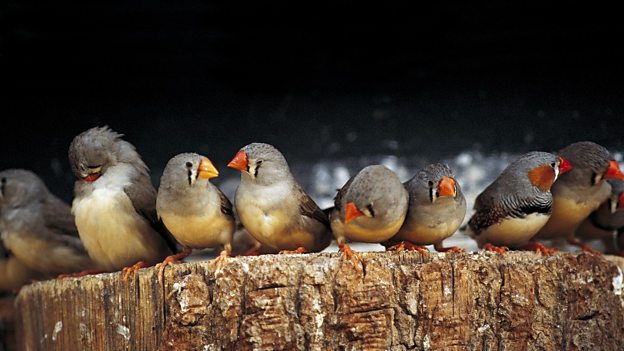文字稿
“珍珠鳥”的學名是斑胸草雀。在炎熱的天氣環境中,澳大利亞的斑胸草雀會對著自己的胚胎“唱歌”。研究發現,這種鳥在孵卵期發出的叫聲可能會影響其雛鳥的生長。這項令人驚嘆的成果表明,該類鳥會為應對其幼崽孵化后所處的高溫環境做出準備。請聽 Jonathan Webb 的報道。
The study began when researchers noticed wild zebra finches, alone with their eggs, singing this squeaky little song. Closer inspection revealed that this was only happening when the temperature climbed above 26 degrees. But what does this mean to a zebra finch embryo?
Based on experiments in incubators and aviaries, it's a bit like a prenatal weather warning. Eggs that were played recordings of the 26-degree song hatched birds that grew up better adapted to the heat. They developed more slowly, happily chose warmer nesting spots, and had more babies of their own than their siblings.
If you're a zebra finch and you live in the desert, it seems it may never be too early to start talking to your kids - about the weather.
詞匯表
zebra finches?斑胸草雀,“珍珠鳥”
squeaky(叫聲)尖促的
inspection?檢驗,檢查
climbed(數量、價格、氣溫等)上升、增長
embryo?胚胎
incubators(人工培養雛鳥、魚苗的)孵化器
aviaries?大型鳥舍,鳥籠
prenatal?產前的
weather warning 天氣預警
hatched 孵出了
better adapted?更好地適應(某種環境)
nesting spots?筑巢處,做窩的地點
測驗
請聽報道并回答下列問題。
1. At what temperature would the zebra finches start to sing the 'heat song' to their eggs?
2. Where did the scientists conduct the experiments?
3. True or false? Hatchlings that received the 'incubation calls' had fewer babies than the control group.
4. Which word is used to mean 'brothers and sisters'?
答案
1. At what temperature would the zebra finches start to sing the 'heat song' to their eggs?
The zebra finches would start to sing the 'heat song' to their eggs at 26 degrees.
2. Where did the scientists conduct the experiments?
The scientists conducted the experiments in incubators and aviaries.
3. True or false? Hatchlings that received the 'incubation calls' had fewer babies than the control group.
False. Eggs that were played recordings of the 26-degree song had more babies of their own than their siblings.
4. Which word is used to mean 'brothers and sisters'?
Siblings.












